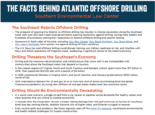Stopping offshore drilling
Protecting our Southern coasts
Our Southern beaches are world-famous tourist destinations, and our fisheries are among the most productive in the world. Clean water and unspoiled beaches provide billions of dollars in revenue to our coastal states. That’s why state and local officials have overwhelmingly opposed opening the Atlantic to offshore drilling. One of our driving priorities for the past decade has been to protect the Atlantic Ocean from all forms of fossil-fuel exploration and drilling.
And we’re also working to ensure the health and safety of Gulf of Mexico communities who have historically borne the brunt of offshore drilling. We have opposed new leasing in the Gulf based on threats to Black and Brown communities, the climate, and the natural resources that are still recovering from the effects of the historic Deepwater Horizon disaster in 2010. We have been part of extensive efforts to improve safety regulations for existing drilling and help this region transition away from harmful fossil fuels and toward a clean energy future.
Facing multiple challenges
SELC has long been committed to protecting our Southern coasts from offshore drilling. We were among the first in the nation to file lawsuits responding to the environmental disaster of the Deepwater Horizon oil spill. What our attorneys saw there solidified our position that we both had to clean up this dirty industry where it already exists, and that we could never let oil drilling get a foothold in the Atlantic. Tourism and fishing are the economic backbone of hundreds of communities along both the Gulf and Atlantic coasts, relying on a healthy environment to support healthy communities. And our beautiful and biologically rich Southern Coast features some of the most beloved places in the country, including the Chesapeake Bay, the Pamlico Sound, the ACE Basin, Dauphin Island, and Mobile Bay.
Despite all of this, both the Obama and the Trump administrations raised the possibility of opening the Atlantic to drilling, and both of them and the Biden administration proposed to keep drilling in the Gulf.
We have worked with partners, coastal residents and coastal businesses to elevate their voices and raise their objections. For many of our communities, oil-industry plans risked thousands of jobs and millions of dollars in community revenue. On the Atlantic, the coastal outcry caused the Obama administration to reverse its stance, and the Trump administration was never able to follow through with plans to open the Atlantic to oil companies. In the Gulf, we are still fighting to protect these at-risk communities.
Virginia’s coastal tourism brings in more than $4 billion into the state every year. The vitality of our businesses in coastal communities is dependent on the environmental well-being of our waters.
Laura Habr, co-owner of Croc’s 19th Street Bistro in Virginia Beach
Going to court
To stop the possibility of oil drilling, we went to court to stop the dangerous first step in the process: the sonic mapping of the ocean floor in the search for oil deposits. The loud airgun blasts used by the seismic industry are known to harm fisheries and ocean life, particularly the critically endangered North Atlantic right whale.
We went to court to stop these seismic companies and our legal challenge ended when the seismic companies announced they would no longer seek approval to blast.
And with opposition to drilling in the Atlantic a hot topic on the 2020 campaign trail, President Trump granted ten years of protection from oil and gas leasing to the coasts of the Carolinas, Georgia and Florida. Even with these temporary protections in place, SELC is working with Congress and the Biden administration to ensure a permanent ban on offshore drilling.
Additional Resources

Hurricane Report



